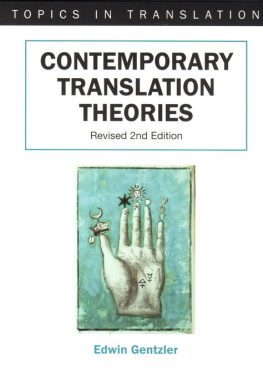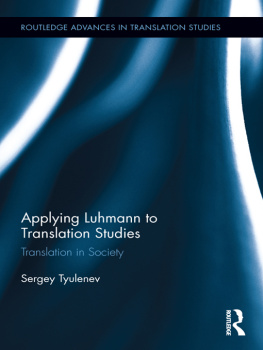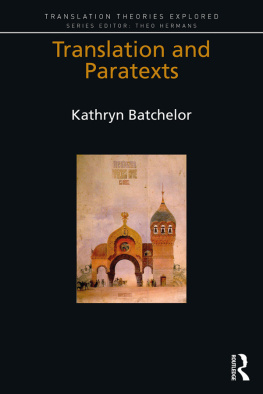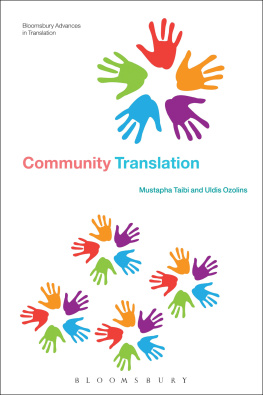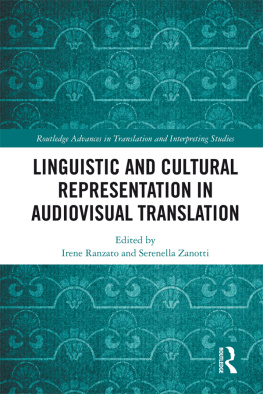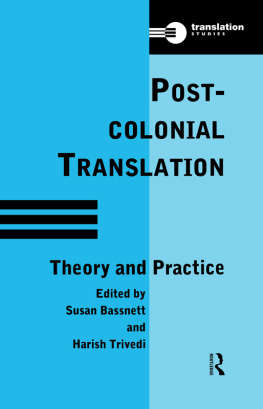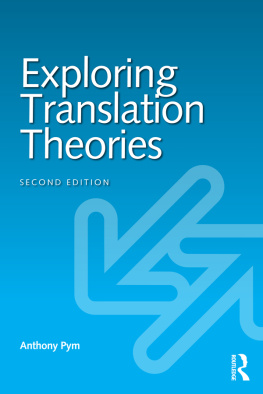TOPICS IN TRANSLATION
Series Editors: Susan Bassnett, University of Warwick, UK and Edwin Gentzler, University of Massachusetts, Amherst, USA
Editor for Translation in the Commercial Environment:
Geoffrey Samuelsson-Brown, University of Surrey
Other Books in the Series
Annotated Texts for Translation: French English / English French
Beverly Adab
Annotated Texts for Translation: English German
Christina Schffner with Uwe Wiesemann
Behind Inverted Commas: Translation and Anglo-German Cultural Relations in the Nineteenth Century
Susanne Stark
Constructing Cultures: Essays on Literary Translation
Susan Bassnett and Andr Lefevere
Culture Bumps: An Empirical Approach to the Translation of Allusions
Ritva Leppihalme
Linguistic Auditing
Nigel Reeves and Colin Wright
Paragraphs on Translation
Peter Newmark
A Practical Guide for Translators
Geoffrey Samuelsson-Brown
The Coming Industry of Teletranslation
Minako OHagan
The Interpreters Resource
Mary Phelan
The Pragmatics of Translation
Leo Hickey (ed.)
The Rewriting of Njls Saga: Translation, Ideology, and Icelandic Sagas
Jn Karl Helgason
Translation, Power, Subversion
Romn Alvarez and M. Carmen-Africa Vidal (eds)
Translation and Nation: A Cultural Politics of Englishness
Roger Ellis and Liz Oakley-Brown (eds)
Time Sharing on Stage: Drama Translation in Theatre and Society
Sirkku Aaltonen
Words, Words, Words. The Translator and the Language Learner
Gunilla Anderman and Margaret Rogers
Written in the Language of the Scottish Nation
John Corbett
Please contact us for the latest book information:
Multilingual Matters, Frankfurt Lodge, Clevedon Hall,
Victoria Road, Clevedon, BS21 7HH, England
http://www.multilingual-matters.com
TOPICS IN TRANSLATION 21
Series Editors: Susan Bassnett, University of Warwick and
Edwin Gentzler, University of Massachusetts Amherst
Contemporary
Translation Theories
Second Revised Edition
Edwin Gentzler
MULTILINGUAL MATTERS LTD
Clevedon Buffalo Toronto Sydney
In memory of Paul Engle
Library of Congress Cataloging in Publication Data
Gentzler, Edwin
Contemporary Translation Theories/Edwin Gentzler 2nd edn
Includes bibliographical references and index.
1. Translating and interpreting. I. Title. II. Series.
P306.G44 2001
41802dc21 2001031574
British Library Cataloguing in Publication Data
A catalogue entry for this book is available from the British Library.
ISBN 978-1-84769-562-8
Multilingual Matters Ltd
UK: Frankfurt Lodge, Clevedon Hall, Victoria Road, Clevedon BS21 7HH.
USA: UTP, 2250 Military Road, Tonawanda, NY 14150, USA.
Canada: UTP, 5201 Dufferin Street, North York, Ontario M3H 5T8, Canada.
Australia: Footprint Books, Unit 4/92a Mona Vale Road, Mona Vale, NSW 2103, Australia.
Copyright 2001 Edwin Gentzler.
All rights reserved. No part of this work may be reproduced in any form or by any means without permission in writing from the publisher.
Printed and bound in Great Britain by the Cromwell Press Ltd.
Contents
Series Editors Preface
The decision to publish a new, heavily revised and updated edition of Edwin Gentzlers ground-breaking book, Contemporary Translation Theories is a timely one. As research in Translation Studies continues to expand, there is more need than ever for a book that sets out clearly and concisely what is happening in different strands within the discipline. Gentzlers broad-ranging perspective traces the development of literary Translation Studies from the American translation workshop programme, through the polysystems research of the 1970s and 1980s to deconstruction, the cultural turn, postcolonial translation theory and beyond.
Gentzlers skills in translation are not confined to theorizing. This book is effectively also a translation, for the author transforms a whole range of complex theoretical material into accessible language, so that anyone with no prior knowledge of the field could pick up this book and gain insights. Nor is this accidental: as Translation Studies extends its horizons, borrowing from other disciplines and in turn cross-fertilizing some of the disciplines, it is important for there always to be terminological accessibility. In this book, Gentzler takes the reader into areas of great theoretical sophistication, yet always discussing terms and concepts in ways that are enabling.
Translation Studies has grown beyond all expectations in the last twenty-five years. Gentzler maps some of the processes of the changes that the subject has undergone in its struggle to gain academic respectability and establish itself in distinctive terrain of its own. He also points to ways in which Translation Studies seems to be developing for the future, enthusiastically advocating the closer relations between related disciplines such as literary studies, linguistics, history, ethnography, anthropology and sociology. The future of Translation Studies looks bright: Gentzlers book offers a shrewd analysis of what has been achieved so far and insights into what the next phase of development is likely to show. This exciting new book will be welcomed by anyone with an interest in studying translation in the twenty-first century.
Susan Bassnett
Preface to First Edition
The formulation of this project began in the early 1980s at the International Writing Program (IWP) at the University of Iowa, where I worked on translations of poems and short stories and helped arrange panel discussions on the literary situation in various countries around the world. Because the University of Iowa houses not only outstanding English and foreign language departments, but also the famed Writers Workshop, the IWP members were seldom at a loss for an audience. Fiction and poetry readings at local bookstores as well as the panel discussions at the school were invariably crowded. Yet while creative writers, graduate students, and faculty respectfully attended and listened to the IWP presentations, the international writers work remained a curiosity rather than an integral part of the literary community, often referred to by students and professors alike as minor or secondary - separate and to a large degree unequal.
The reception of the foreign writers work, in turn, did affect the nature of the International Writing Programs translation work. The desire of many international writers to be translated, published, and valued in English was enormous. While some measure of acceptability was gained in Iowa City and at certain university campuses in the United States, it was almost impossible to place translations in mainstream literary journals. The visiting writers reacted differently to such cultural disinterest. Some members, who had arrived in the United States eager to read, to talk, to exchange ideas and texts, withdrew because their work did not conform to the norms governing current literary taste in this country. Generally, these IWP participants returned to their home countries, wrote an essay about their stay in the USA, and continued with writing projects intended for native audiences, perhaps to return at a later date when conditions were more favorable. Other visiting writers recognized the problem and redirected their energies to conform to thematics and styles that might meet a more favorable reception - but at certain costs. By rewriting texts to appeal to Western audiences, certain themes, styles, modes of reference, and referents themselves were elided from the texts translated. Those silences in the text, often known only to the translator, were often not only the most interesting in terms of creativity, but also the most revealing with regard to cultural differences.
Next page
